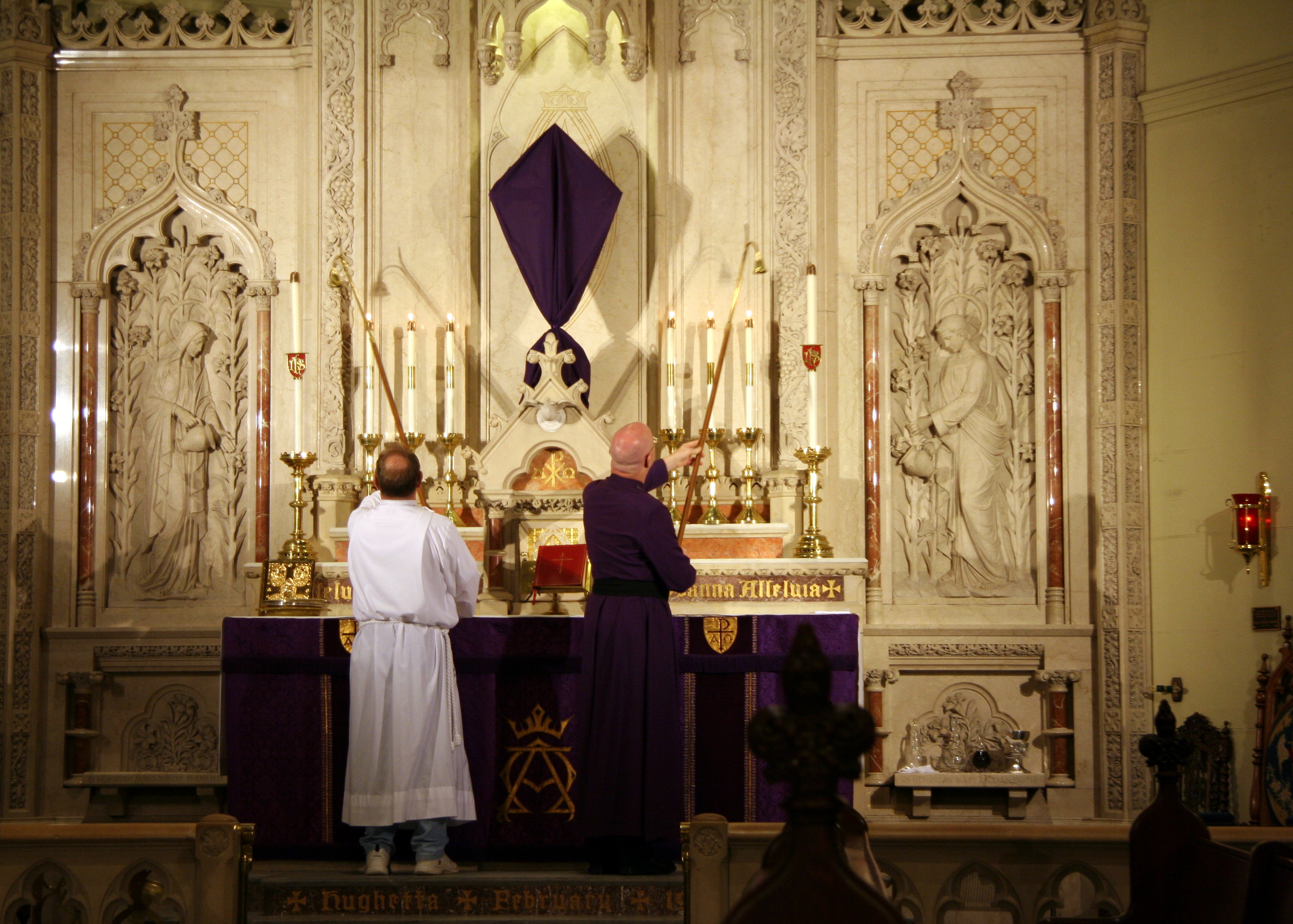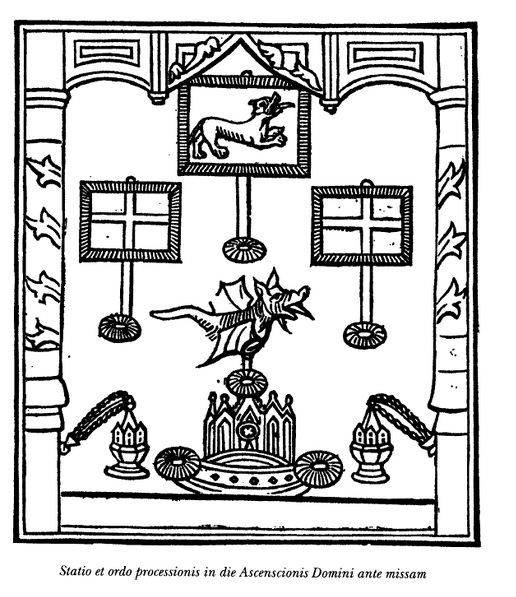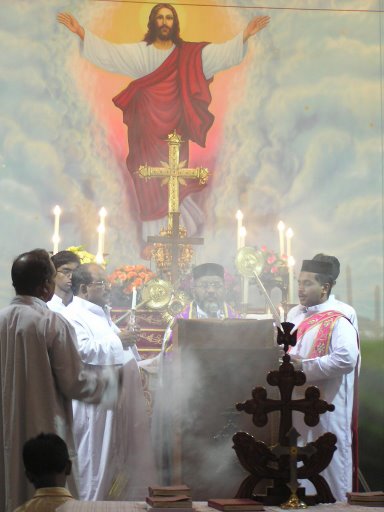|
Ferias
In the Catholic liturgy, liturgy of the Catholic Church, a feria is a day of the week other than Sunday. In more recent official liturgical texts in English, the term ''weekday'' is used instead of ''feria''. If the Calendar of saints, feast day of a saint falls on such a day, the liturgy celebrated may be that of the saint, not that of the ''feria'' (the weekday liturgy). Accordingly, in actual liturgical practice a feria or ferial day is "a weekday on which no special ecclesiastical feast is to be celebrated". Etymology The ''Harvard Dictionary of Music'' explains the etymology ''feria'' as "the reverse of the original meaning of Latin, L. ''feria'', i.e., festival day. The reversal came about by extending the use of the word from Sunday to the other days, Sunday being named ''feria prima'', Monday ''feria secunda'', Tuesday ''feria tertia'', etc." Since in ecclesiastical Latin the names of Sunday and Saturday do not contain the word ''feria'' and are called respectively ' ... [...More Info...] [...Related Items...] OR: [Wikipedia] [Google] [Baidu] |
Ranking Of Liturgical Days In The Roman Rite
The ranking of liturgical days in the Roman Rite is a regulation for the liturgy of the Catholic Church. It determines for each liturgical day which observance has priority when liturgical dates and times coincide (or "occur"), which texts are used for the celebration of the Holy Mass and the Liturgy of the Hours and which liturgical color is assigned to the day or celebration. Ranks Each day in the Catholic liturgical calendar has a rank. The five basic ranks for the Ordinary Form of the Roman Rite, in descending order of importance, are as follows: * Solemnity — the highest ranking type of feast day. It commemorates an event in the life of Jesus or Mary, or celebrates a Saint important to the whole Church or the local community. The Mass of a solemnity has proper readings and prayers, the '' Gloria'' and '' Credo'' are recited, and occasionally there will be use of incense, a processional hymn and procession, and a recessional hymn/recession. Outside of Advent ... [...More Info...] [...Related Items...] OR: [Wikipedia] [Google] [Baidu] |
Memorial (liturgy)
A memorial in the Roman Rite of the Catholic Church is a lower-ranked feast day in honour of a saint, the dedication of a church, or a mystery of the religion. All feast days are ranked according to their importance and named as " solemnities", or "feasts", or "memorials". Memorials are always supplanted by a coinciding solemnity, feast, Sunday, Ash Wednesday, Holy Week, or day of the Octave of Easter. Present rules Observance Celebrations of solemnities and feasts are distinguished from those of memorials by, for instance, recitation of the '' Gloria in excelsis'' in the Mass (an inclusion otherwise allowed only on Sundays) and the '' Te Deum'' in the Liturgy of the Hours. The observance of memorials is integrated into the celebration of the occurring weekday (the '' feria'') according to the norms set forth in the General Instruction of the Roman Missal (GIRM) and the Liturgy of the Hours. The GIRM lays down that, for memorials of saints, "unless proper readings are giv ... [...More Info...] [...Related Items...] OR: [Wikipedia] [Google] [Baidu] |
Ash Wednesday
Ash Wednesday is a holy day of prayer and fasting in many Western Christian denominations. It is preceded by Shrove Tuesday and marks the first day of Lent: the seven weeks of Christian prayer, prayer, Religious fasting#Christianity, fasting and Alms#Christianity, almsgiving before the arrival of Easter. Ash Wednesday is observed by Christians of the Catholic, Lutheranism, Lutheran, Moravian Church, Moravian, Anglican (Episcopal Church (United States), Episcopalian), and United and uniting churches, United Protestant denominations, as well as by some churches in the Reformed tradition, Reformed, (including certain Congregationalist, Continental Reformed, and Presbyterian churches), Baptist, Methodist and Church of the Nazarene, Nazarene traditions. Ash Wednesday is traditionally observed with Religious_fasting#Christianity, fasting and abstinence from meat in several Christian denominations. As it is the first day of Lent, many Christians begin Ash Wednesday by marking a Lenten ... [...More Info...] [...Related Items...] OR: [Wikipedia] [Google] [Baidu] |
Catholic Liturgy
Catholic liturgy means the whole complex of official liturgical worship, including all the rites, ceremonies, prayers, and sacraments of the Church, as opposed to private or collective devotions. In this sense the arrangement of all these services in certain set forms (including the canonical hours, administration of sacraments, etc.) is meant. Liturgy encompasses the entire service: prayer, reading and proclamation, singing, gestures, movement and vestments, liturgical colours, symbols and symbolic actions, the administration of sacraments and sacramentals. Etymology ''Liturgy'' (from ) is a composite word meaning originally a public duty, a service to the state undertaken by a citizen. A ''leitourgos'' was "a man who performs a public duty", "a public servant", ''leitourgeo'' was "to do such a duty", ''leitourgema'' its performance, and ''leitourgia'', the public duty itself. So in the use of liturgy meant the public official service of the Church, that corresponded t ... [...More Info...] [...Related Items...] OR: [Wikipedia] [Google] [Baidu] |
Rogation Days
Rogation days are days of prayer and fasting in Western Christianity. They are observed with processions and the Litany of the Saints. The so-called ''major'' rogation is held on 25 April; the ''minor'' rogations are held on Monday to Wednesday preceding Ascension Thursday. In the Ambrosian Rite minor rogations were celebrated on Monday, Tuesday, and Wednesday after Ascension, preparing to celebrate Pentecost. The word ''rogation'' comes from the Latin verb , meaning "to ask", which reflects the beseeching of God for the appeasement of his anger and for protection from calamities. Rogation Sunday is celebrated on the 5th Sunday after Easter (also known as the 6th Sunday of Easter) in the Anglican tradition. This day is also known in the Lutheran tradition as Rogate Sunday. Christian beginnings The Christian major rogation replaced a pagan Roman procession known as Robigalia, at which a dog was sacrificed to propitiate Robigus, the deity of agricultural disease. The pract ... [...More Info...] [...Related Items...] OR: [Wikipedia] [Google] [Baidu] |
Commemoration (liturgy)
In the Latin liturgical rites of the Catholic Church, a commemoration is the recital, within the Liturgy of the Hours or the Mass of one celebration, of part of another celebration that is generally of lower rank and impeded because of a coincidence of date. Parts used in commemorating The parts commemorated are readings, antiphons, and prayers. In the Liturgy of the Hours, all three are or have been used: a reading of the commemorated celebration in Matins (Office of Readings); the antiphons of the '' Benedictus'' in Lauds and of the '' Magnificat'' in Vespers; and the proper prayer of the celebration being commemorated, the same as the collect of its Mass. In Mass, the prayers used are the collect, the prayer over the offerings and the prayer after Communion. Furthermore, before the decree ''Cum nostra hac aetate'' of 1955, in the Liturgy of the Hours the verse of the short responsory in Prime and the doxology of hymns of a commemorated feast that had special (" ... [...More Info...] [...Related Items...] OR: [Wikipedia] [Google] [Baidu] |
Pentecost
Pentecost (also called Whit Sunday, Whitsunday or Whitsun) is a Christianity, Christian holiday which takes place on the 49th day (50th day when inclusive counting is used) after Easter Day, Easter. It commemorates the descent of the Holy Spirit in Christianity, Holy Spirit upon the Apostles in the New Testament, Apostles of Jesus, Mary, mother of Jesus, Mary, and other followers of the Christ, while they were in Jerusalem during the Second Temple Period, Jerusalem celebrating the Feast of Weeks, as described in the Acts of the Apostles (Acts 2:1–31). Pentecost marks the "Birthday of the Church". Pentecost is one of the Great feasts in the Eastern Orthodox Church, a Solemnity in the Roman Rite of the Catholic Church, a Liturgical calendar (Lutheran)#Festivals, Festival in the Lutheranism, Lutheran Churches, and a Principal Feast in the Anglican Communion. Many Christian denominations provide a special liturgy for this holy celebration. Since its date depends on the date of Eas ... [...More Info...] [...Related Items...] OR: [Wikipedia] [Google] [Baidu] |
Feast Of The Ascension
The Feast of the Ascension of Jesus Christ (also called the Solemnity of the Ascension of the Lord, Ascension Day, Ascension Thursday, or sometimes Holy Thursday) commemorates the Christian belief of the bodily Ascension of Jesus into Heaven. It is one of the ecumenical (shared by multiple Christian denomination, denominations) feasts of Christian churches, ranking with the feasts of the Passion (Christianity), Passion and Pentecost. Following the account of that the risen Jesus appeared for 40 days prior to his Ascension, Ascension Day is traditionally celebrated on a Thursday, the fortieth day of Easter according to inclusive counting, although some Christian denominations have moved the observance to the following Sunday, sometimes called Ascension Sunday. The day of observance varies by ecclesiastical province in many Christian denominations, as with Lutherans and Catholics, for example. Ascensiontide refers to the ten-day period between the Feast of the Ascension and the Fe ... [...More Info...] [...Related Items...] OR: [Wikipedia] [Google] [Baidu] |
Epiphany (holiday)
Epiphany ( ), also known as "Theophany" in Eastern Christian tradition, is a Christian feast day commemorating the visit of the Magi, the baptism of Jesus, and the wedding at Cana. In Western Christianity, the feast commemorates principally (but not solely) the visit of the Magi to the Christ Child, and thus Jesus Christ's physical manifestation to the Gentiles. It is sometimes called Three Kings' Day, and in some traditions celebrated as Little Christmas. Moreover, the feast of the Epiphany, in some denominations, also initiates the liturgical season of Epiphanytide. Eastern Christians, on the other hand, commemorate the baptism of Jesus in the River Jordan, seen as his manifestation to the world as the Son of God, and celebrate it as the Feast of the Epiphany or of the Theophany. The traditional site of the ministry of John the Baptist is in Al-Maghtas in Jordan, with the baptism of Jesus once marked in Byzantine times by a cross in the middle of the Jordan River, b ... [...More Info...] [...Related Items...] OR: [Wikipedia] [Google] [Baidu] |
Solemnity
In the liturgical calendar of the Roman Rite, a solemnity is a feast day of the highest rank celebrating a mystery of faith such as the Trinity, an event in the life of Jesus, his mother Mary, his legal father Joseph, or another important saint. The observance begins with the vigil on the evening before the actual date of the feast. Unlike feast days of the rank of feast (other than feasts of the Lord) or those of the rank of memorial, solemnities replace the celebration of Sundays outside Advent, Lent, and Easter (those in Ordinary Time).Universal Norms on the Liturgical Year and the Calendar 59 The word comes from postclassical , meaning a solemnity, festival, cele ... [...More Info...] [...Related Items...] OR: [Wikipedia] [Google] [Baidu] |




